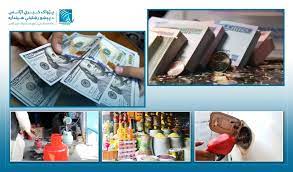KABUL (Pajhwok): Year 2023 saw the prices of essential daily-use commodities falling by up to 13 percent in Afghanistan and the value of the afghani surging by 21 percent against the US dollar compared to 2022, Pajhwok has learnt. However, in international markets, the prices of basic items dropped by an average of 14 percent in 2023.
Some people complain prices fell less than the increase in the value of afghani and some analysts say the rates fell slightly because the economic mafia does not allow them to fall, along with other reasons.
Analysts say that the government should seriously prevent monopoly and hoarding. But the Kabul municipality says it strictly monitors the rates and allows no one to be involved in hoarding. According to Pajhwok’s weekly economic reports, on Dec. 31 2022, the price of a 49-kilogram of Kazakhistani flour was 2,200afs, a 24-kg bag of Pakistani rice 3,000afs, a 49-kilogram sack of sugar 3,000afs, 16-litre tin of cooking oil 1,800afs, one kilogram of Indonesian green tea 350afs and the same amount of black African tea was 400afs.
On the same date, one litre of petrol was sold for 75afs, one litre diesel for 91afs and a kilogram of liquefied gas 62afs. But a year after on December 31st of 2023, a 49-kilogram sack of Kazakh flour cost 1,600afs, a 24 kilograms of rice 2,600afs, 49-kilograms of sugar 3,100afs, 16-litre cooking oil 1,350afs, a kilogram of Indonesian green tea 350afs and the same amount of African black team 400afs.
Also, one litre of petrol was sold for 72afs, one litre of diesel 61afs and a kilogram of liquified gas 51afs. But last year, one US dollar was traded for 89afs, but this year it exchanges rate dropped to 70.3afs. Compared to 2022, the value of the dollar against the local currency fell by 21 percent, but the rates of essential goods dropped by an average of 13 percent in 2023
Rates of goods in international market
According to the information of the Trading Economic page, compared to 2022, the prices of basic goods in the world market fell by 14 percent on average in 2023. On December 31st of 2022, the price of per pound sugar was $18.9, a kilogram of tea $2.92, wheat (USd/Bu) $767, rice (USD/cwt) $14.9, Palm Oil (MYR/T) $897.18, Crude Oil WTI (USD/Bbl) $76.3, and Natural gas (USD/MMBtu) $3.67.
But on the same date in 2023, the price of sugar per pound was $20.9, a kilogram of tea $2.7, wheat (USd/Bu) $618, rice (USD/cwt) $17.1, Palm Oil (MYR/T) $795.31, Crude Oil WTI (USD/Bbl) $72.4, and Natural gas (USD/MMBtu) $2.83. Shopkeepers sell goods at inflated rates: Customers
Haji Nasrullah, a resident of Kabul City, said when the value of the dollar increases, the prices also surge, but currently the value of the afghani had increased, but the rates did not.
He said the government should provide price lists to all shopkeepers, monitor them seriously and take legal action against those selling goods at high rates.
Nasser Ahmad, another resident of Kabul, acknowledged that after the re-establishment of the Islamic Emirate, the prices had been controlled to an extent, but considering the decline in the dollar’s rate and unemployment, the government should take more serious steps in this regard.
“The value of the afghani is increasing with each passing day and we ask businessmen to consider the purchasing power of the people, if someone does injustice, the government should deal them legally,” he added.
“Mafia behind price-hike
Abdul Nasir Reshtia, an economic affairs expert, said preventing the smuggling of dollars from Afghanistan, the use of foreign currency in business transactions as international humanitarian assistance led to the increase in the value of the afghani against the dollar.
He said: “Afghanistan is an importing country, it buys all goods in dollars, but why the increase in the value of the afghani has no much effort on the prices, this is because Afghanistan does not have an organized railways system, it does not have a well-equipped transportation system, and the prices of goods imported to the country are very high. Also, there is still mafia that has monopoly and is involved in hoarding and does not let the prices drop.”
According to him, the government needs to seriously fight to break the monopoly of mafia and make the markets competitive so that the prices of goods could decrease.
He said the Afghan government should create other facilities in the fields of export, domestic production and investment in order to maintain the value of the afghani.
Niamatullah Barakzai, a spokesman for the Kabul municipality, told Pajhwok Afghan News that their department has been distributing price lists in the markets of Kabul since last two years and was closely monitoring their implementation. He added: “Currency alone does not have an effect on commodity prices, but it can be a reason. Essential items are mostly imported goods and sometimes their prices go up in the world markets, as you know when the war in Ukraine started, there was no oil in Europe, the dollar was in stable, but the prices went up once.” “Of course, this has an impact on Afghanistan’s market, and the issue of transport and distance is also important, but Alhamdulillah, this problem has been mostly solved now,” he explained.
Barakzai said if last year’s price lists were compared with the current ones, the prices of basic goods had changed a lot and had decreased.
He said the municipality strongly prevented hoarding.







